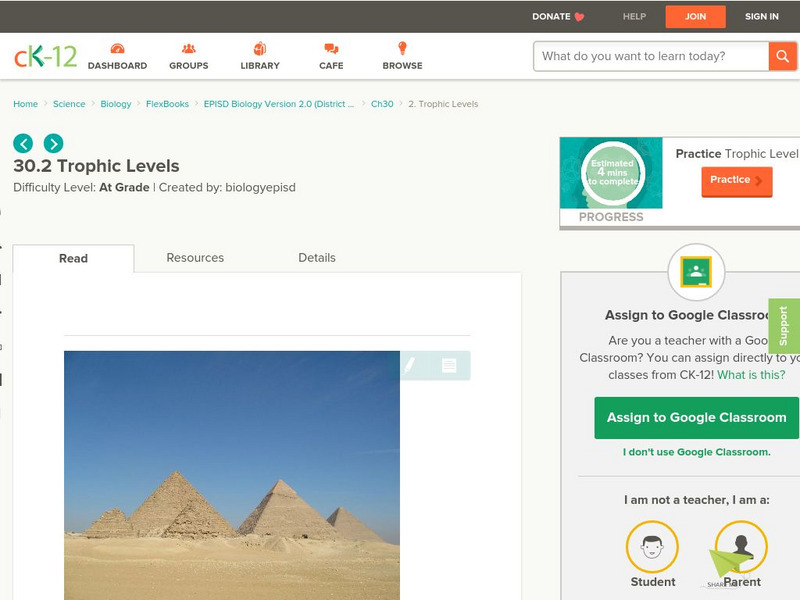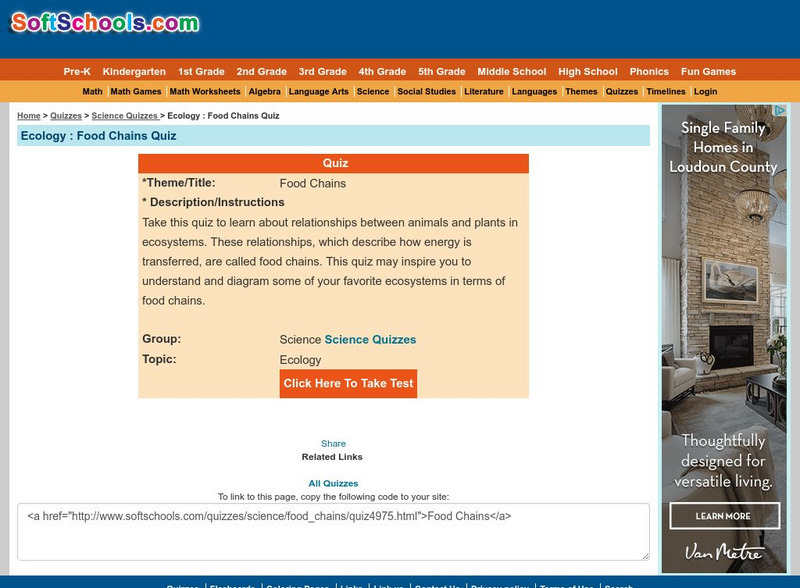Hi, what do you want to do?
TeachEngineering
Teach Engineering: Food Chains and Food Webs
This lesson, supported by the provided power point lecture (LESSON 1 and 2 Ecology Lecture Supplement ), introduces students to the concepts of food chains and food webs. Through its use, students learn the difference between producers...
TeachEngineering
Teach Engineering: Constructing Sonoran Desert Food Chains and Food Webs
Is the food chain shown above accurate? Does the first link depict a producer, the second link a herbivore, and the third link an omnivore / carnivore? Students must correctly determine whether a species is a producer or consumer, and...
CK-12 Foundation
Ck 12: Food Chains and Food Webs
[Free Registration/Login may be required to access all resource tools.] Videos, texts, activities, and assessments about food chains and food webs in an ecosystem.
Sophia Learning
Sophia: Food Webs: Lesson 1
This lesson will explain how to create a food web to show transfer of energy within a community. It is 1 of 4 in the series titled "Food Webs."
SMART Technologies
Smart: Ecosystem Food Chain and Food Web
Starts with living and non living and works through producers, consumers, food chains and food webs.
Massachusetts Institute of Technology
Mit: Open Course Ware: Courses: Civil Environmental: Ecology I: The Earth System
College-level online course highlighting the fundamentals of ecology. Course topics include coevolution of the biosphere, geosphere, atmosphere, and hydrosphere; photosynthesis and respiration; and the carbon, nitrogen, and water cycles....
Other
Zephyrus: Food Puzzle Chain
Answer these ten interactive questions about ecological feeding relationships by choosing the correct image that completes each food chain.
Sheppard Software
Sheppard Software: Parts of the Food Chain: Producers, Consumers, Decomposers
Learn how scientists classify different types of organisms in an ecosystem or in a food chain by their role and function as either a producer, a consumer, or a decomposer. Then play a game that tests your understanding of these important...
Georgia Department of Education
Ga Virtual Learning: Biology: Ecology I
A comprehensive ecology learning module where students assess the dependence of all organisms on one another and the flow of energy and matter within their ecosystems.
CK-12 Foundation
Ck 12: Episd: Trophic Levels
[Free Registration/Login may be required to access all resource tools.] Understand what trophic levels are and identify producers and consumers in a food web.
Soft Schools
Soft Schools: Food Chains Quiz
Take an interactive quiz over food chains. After completing the quiz, check your score, and then revisit any incorrect question for further review.
Project Britain
Primary Homework Help: Food Chains Quiz
Brush up on food chain vocabulary before taking this interactive quiz. Check the box for the correct answers throughout the assessment.
Science Education Resource Center at Carleton College
Serc: Food Chains: Nature's Restaurant
Students begin this lesson by making observations and recording evidence of the variety of living things in local nature site. Students use reference materials to research predators and food of the animals they observed, then illustrate...
Bio Topics
Bio Topics: Ecological Pyramids
A colorful tutorial about ecological pyramids. Read the information, and then check your understanding with some questions and answers about the topic.
Georgia Department of Education
Ga Virtual Learning: Ecosystems
This module offers an in depth study of the fundamental components of ecosystems. Activities include mini-lessons with videos and student assignments.
ArtsNow
Arts Now Learning: Using Tableau and Role Drama to Examine the Ecosystem [Pdf]
In this lesson, 4th graders use tableaux to dramatize their roles in the food chain of an ecosystem. Next, they write in role arguing why they are important to the ecosystem. This is followed by a debate in the format of a Character...
Shmoop University
Shmoop: Ecosystem Energy Flow
Explains the processes by which energy flows through an ecosystem. Covers the meanings of key vocabulary, e.g., types of producers and consumers, trophic levels, food webs, and the energy pyramid.



















